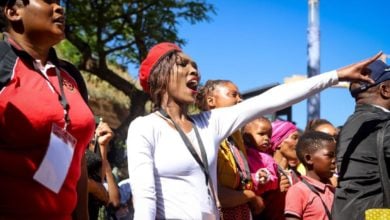Listen to this article:
In a few short months, the novel coronavirus COVID-19 has swept the world without any proven treatment or vaccine. By early May 2020, over 3.6 million cases have been confirmed and over 250,000 have died, both of which continue to increase rapidly.
Around 100 potential vaccines and 250 antiviral drugs are undergoing testing, but it’s not clear when these will be approved for human use. Despite Donald Trump’s claim that he was “very confident” a vaccine will be ready later this year, even the experts’ most optimistic estimates are that we are 12-18 months away, but it’s likely to be longer. While the realities of vaccine development are undeniable — vaccines are extensively tested before proven both effective and safe — much of the blame lies with capitalism.
Why are there no vaccines against coronaviruses?
While COVID-19 is newly discovered, other coronaviruses have been known for many years. SARS, the virus that caused a global outbreak and over 800 deaths in 2003, is also a coronavirus and is about 80 percent similar to COVID-19. Another coronavirus, MERS, has been responsible for a decade of outbreaks and hundreds of deaths.
Since 2000, the U.S. government has poured over $600 million into coronavirus research. This funding has led to many promising leads, but a SARS or MERS vaccine was never fully developed and tested. This is because the four corporations that dominate vaccine production — Pfizer, Merck, GlaxoSmithKline [GSK] and Sanofi — did not see enough potential profit in fighting coronaviruses that often fade in prevalence after several years, instead favoring viruses with more staying power. This decision proved costly when another coronavirus appeared in 2019. With a vaccine against SARS or MERS, researchers would have had a significant head start in stopping COVID-19.
Other potential COVID-19 treatments have fallen victim to the profit motive. In 2016, a team of researchers led by Dr. Peter Jay Hotez at Texas Children’s Hospital developed a vaccine against one strain of coronaviruses. Despite evidence that this vaccine may also be effective in fighting COVD-19, Dr. Hotez has not been able to secure funding for human trials. He told NBC News on March 5, “We’ve had some conversations with big pharma companies in recent weeks about our vaccine, and literally one said, ‘Well, we’re holding back to see if this thing comes back year after year.’”
In March, Congress struck language from a stimulus bill that would have forced fair pricing of COVID-19 treatments. Soon after, the pharmaceutical giant Gilead was granted “orphan drug status” for remdesivir, an antiviral drug currently being tested against COVID-19. This status allows a company to profit exclusively for seven years. The former chief lobbyist for Gilead, Joe Grogan, serves on the White House’s coronavirus task force. Only after public outcry did Gilead request this status be rescinded.
Even when efforts to create vaccines against viruses are successful — as in the case of Ebola — private companies slow the process. Public financing by the Canadian government led to an Ebola vaccine, which was licensed to Merck. But the company decided against initiating human trials, which were only completed years later using additional public and donor funding.
Vaccine development under socialism provides a different model. Cuba has developed vaccines to many diseases including pneumonia and meningitis that afflict impoverished countries and has distributed these around the world at low cost. Cuba is now testing a vaccine that activates the immune system to see if it is effective against COVID-19.
Racist anti-China attacks block promising COVID-19 research
Progress toward a COVID-19 treatment is also being delayed by anti-China racism by the U.S. government. For 15 years, the National Institutes of Health has funded a highly successful study, led by New York-based nonprofit EcoHealthAlliance, that collaborates with a virology lab based in Wuhan, China. The Chinese lab specializes in coronaviruses that jump from bats to humans, the suspected route of both SARS and COVID-19.
In late April, NIH abruptly cut the funding, citing “safety concerns,” but there is no evidence to support this. As the Trump administration attempts to demonize China and shift blame from its slow response, a promising research study has fallen victim. Gerard Keusch, director of National Emerging Infectious Diseases Laboratory at Boston University, called NIH’s move “the most counterproductive thing I could imagine” given the research’s relevance to understanding the current pandemic and avoiding future viral outbreaks.
This demonization of China in the period of the recent pandemic recently reached a heightened and ominous level by the U.S. State Department, with Secretary of State Mike Pompeo’s unfounded claims of Chinese malicious acts. These claims have been denounced repeatedly by the scientific community as false. Military aggression by the U.S. against China, which historically has followed such demonization campaigns, would further slow the development of a COVID-19 vaccine.
In fact, China has been lauded for its swift actions to contain COVID-19, including by WHO Director General Tedros Adhanom. Upon isolating the virus in December, Chinese researchers immediately shared the genetic sequence, which enabled the developments of tests and research into cures, and has provided medical aid to many countries. China is also testing a number of COVID-19 vaccines, several of which have already shown promising results. While COVID-19 vaccine production has been presented in the corporate media as a “global race” pitting country against country, this is largely false. Many of the vaccine efforts are multinational, including several collaborations between U.S.- and China-based researchers.
Will a COVID-19 vaccine be distributed at low-cost?
The capitalist mode of production is slowing the development of vaccines including for COVID-19. When the polio vaccine was developed in the 1950s, inventor Jonas Salk famously compared the absurdity of patenting the polio vaccine to “patenting the sun.” If a vaccine is treated as a commodity instead of as a public good, the price paid is in human lives lost.
A global pandemic must be matched by a global effort. The World Health Organization and European Union have launched plans to coordinate efforts on vaccine research and production — efforts the U.S. has so far refused to join. The effort to produce and distribute hundreds of millions or billions of vaccine doses is staggering but can be achieved through international cooperation for the benefit of all.






